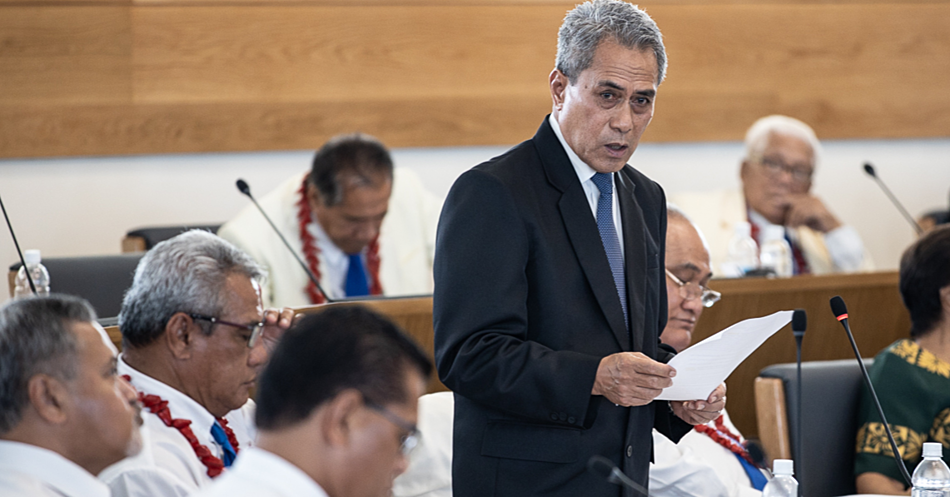How Indonesia can help Samoa
Indonesia is offering help to Samoa through the Indonesia Technical Cooperation Programme. Director for Technical Cooperation Ministry of Foreign Affairs of the Republic of Indonesia, M. Syarif Alatas, told the Samoa Observer that the programme has been in place since the 1970s.
He said Indonesia has been actively involved in providing technical assistance and capacity building programmes in the framework of South-South Cooperation and Samoa can benefit from the assistance offered in this program.
A delegate at the recent Pacific Islands Forum, Alatas told the Samoa Observer that Indonesia is committed to help Samoa and other Pacific Island countries.
“Indonesia is committed to contributing and taking an active role in the development cooperation among southern countries,” he said.
“Indonesia’s active participation in South-South Cooperation is also one of the concrete steps in fulfilling its commitment to contribute to the world peace and prosperity as stipulated in the Preamble of 1945 Indonesian Constitution.”
According to the Director, Indonesia’s technical cooperation within the framework of South-South Cooperation has become one of the national priorities.
“And this technical assistance is made available to Samoa,” he said.
“During the period of 1999 to 2016, Indonesia has provided at least 501 capacity building programmes involving 6,244 participants from 124 entities consisting of 118 countries, 5 international organizations, and one economic entity.
“Indonesia provides technical assistance based on several principles, such as equality, solidarity, demand driven, mutual respect, mutual benefit and opportunity, and no conditionality.”
He said they have covered various fields of cooperation by which Indonesia’s technical assistance were conducted are agriculture, fisheries, disaster risk management, forestry, health, education, climate change, community and women empowerment, SMEs, trade, finance, industry, good governance, public order management, information and communication technology, infrastructure, energy and mineral resources, tourism, art and culture.
“The implementation of the technical assistances are usually in the form of training, workshop, dispatch of experts, apprenticeship, and scholarship and again Samoa can be a part of these programs,” he said.
Indonesia has several centers of excellence as the implementing agencies of technical assistance, such as Bogor Agricultural University, Multimedia Training Center (MMTC), Electronic Engineering Polytechnic Institute of Surabaya, Singosari National Artificial Insemination Center, and Tsunami and Disaster Mitigation Research Center (TDRMC) in Syiah Kuala University.
According to the Director, Indonesia has been long involved in sharing capacity building programs to countries in Pacific region.
“Countries in the Pacific region including Samoa have become one of the priorities of Indonesia’s technical assistance.
“In bilateral and triangular cooperation, Indonesia has conducted various capacity building programmes.
“During 1999 to 2016, Indonesia at least has conducted 182 programmes followed by 1457 participants from countries in the Pacific region.
“The area of programmes among other are fisheries, agriculture, democracy and good governance, disaster risk management, seaweed processing technique and entrepreneurship.
“Every year, Indonesia conduct several capacity building programmes for participants from the region.
“The purposes of those capacity building programmes are to encourage the economic development, connectivity and people-to-people contact between Indonesia and countries in Pacific region,” said the Director for Technical Cooperation Ministry of Foreign Affairs.
He said in the second half of the 2017, the Government of the Republic of Indonesia will organize capacity building programmes in coconut development and ecotourism; and, participants from P.I.F. member countries are invited to come to Indonesia to follow the programmes and the invitation is extended to Samoa.
“In 2018, the Government of the Republic of Indonesia has planned to organize capacity buildings programmes for Asia Pacific countries on Small and Medium-sized Enterprises (SMEs) and aquaculture.”
He said that since 2003, their government has also been annually granting Indonesian Art and Culture Scholarships (BSBI) to foreign students to study Indonesian art and culture and this programme is also available to Samoan students.
“B.S.B.I. is a three-month programme consisted of various activities in art and culture studio to learn Indonesian language, cultural arts diversity, local wisdom, and religion through.
“The scholarship programme has 238 alumni from 16 countries in the pacific region. “Indonesian Government also provides Darmasiswa Scholarship at the University in various cities in Indonesia.
“Darmasiswa Scholarship is a non-degree scholarship programme (usually for 1 until 2 years) that offers opportunities to learn Indonesian language, as well as Indonesian arts, music, and crafts; and, it has produced 356 alumni from 5 countries in the Pacific region since 1974.
“The main goal of the Darmasiswa programme is to promote and to increase the interest of foreign youths towards Indonesian language and culture as well as to enhance mutual understanding between cultures of each participating country,” he said. He further told the Samoa Observer that other scholarships given by the Indonesian government is the Developing Countries Partnership Scholarship (DCPS) officially launched in 2006.
“This scholarship is offered to prospective students from developing countries to earn their Master's degree in various universities in Indonesia and this is also available for Samoan students,” he said. This scholarship has been given to 55 students from three countries in the Pacific region.
“This scholarship is awarded for three years under which the first year will be programmed to learn Indonesian language and preparation for the Graduate Degree.
“The objectives of this Scholarship programme are (1) to contribute to the development of human resources in developing countries; (2) to promote a deeper cultural understanding between developing countries; and (3) to strengthen relations and cooperation between developing countries,” said the Director.











